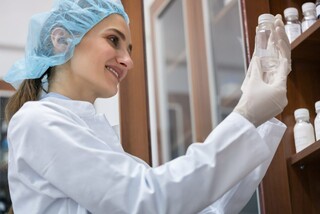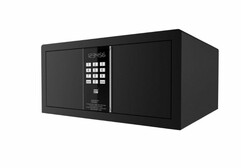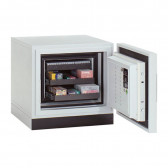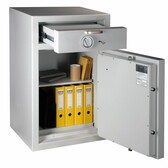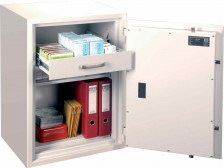Pharmacies, hospital wards, clinics and nursing homes are just a few of the institutions where a good safe is indispensable. They store medicines, narcotics, sensitive personal data or valuables, which should only be accessed by authorised people. The selection of safes for medical facilities is constantly expanding, so we suggest what to consider when choosing a solid and safe model.
Safes in medical facilities – which ones to choose?
In many companies and institutions, it is the risk of theft of cash, leakage of personal data or know-how that prompts them to invest in a solid safe. In the case of medical facilities, we are dealing with a much greater risk, which is related to the nature of their activities. It is important to properly store cash, medicines and narcotics, as well as to equip patients' rooms, secure their data or access to keys. Therefore, let us check which safe is particularly worth paying attention to.
Drug safes
Health and care institutions should have a safe for narcotics. In order for this type of safe to fulfil its purpose and protect drugs, particularly psychotropic substances and anaesthetics, it must be certified in accordance with the PN-EN 1143-1 standard. This is because such drugs must be stored in accordance with regulations laid down in the Regulation of the Minister of Health. When choosing a safe for narcotics for a medical facility, attention should be paid both to meeting legal requirements and choosing the right size of the safe and its equipment. For the convenience of the staff, convenient shelves and drawers for medicines are recommended. Different types of mounting are also possible, depending on the type and weight of the safe. You can choose between models that are built into furniture, permanently fixed to the floor or wall and heavy cabinets that cannot be lifted out.
Safes for patients
In clinics or nursing homes, where patients keep their valuables in their rooms, it's a good idea to install burglar-proof safes. When patients can safely store their personal jewellery, wallet or mobile phone, it reduces the stress associated with their treatment and stay in a medical facility. Equipping a room with a convenient, small hotel safe can help reduce the risk of theft and increase a resident's sense of well-being, thus increasing the attractiveness of the facility.
Safe for the office and administration
A safe in a healthcare facility is also useful for protecting sensitive personal data. Every healthcare facility is obliged to keep medical records, which require special protection. This involves maintaining confidentiality regarding the course of treatment, medication administered, etc. It is worth using burglar-proof safes, which are resistant to fire, to safely store paper patient files. Many models allow valuables and important documents to be stored in them at the same time. If the facility stores data on electronic media, it is necessary to equip it with a special safe for data media, which not only prevents unauthorised people from opening the container, but also protects its contents from fire or water.
Cash at the reception
Despite the popularity of cashless forms of payment, many customers still prefer cash payments, which need to be properly secured. In addition, reception staff often work in shifts, there is a turnover of staff and it is necessary to manage both employees and cash flow. This is made possible by suitable deposit safes that accept deposits from multiple users identified by identity, and allow the manager to audit the operations performed by employees and seamlessly manage access to the safe.
